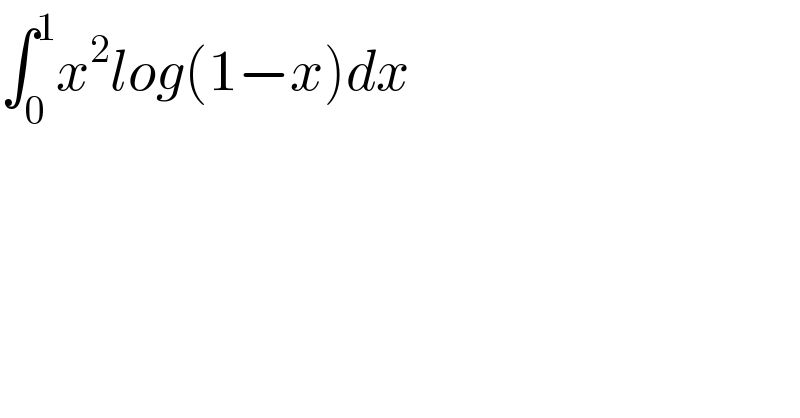Question Number 113159 by Dwaipayan Shikari last updated on 11/Sep/20

$$\int_{\mathrm{0}} ^{\mathrm{1}} {x}^{\mathrm{2}} {log}\left(\mathrm{1}−{x}\right){dx} \\ $$
Answered by MJS_new last updated on 11/Sep/20
![∫x^2 ln (1−x) dx= [by parts] =(x^3 /3)ln (1−x) −(1/3)∫(x^3 /(x−1))dx= =(x^3 /3)ln (1−x) −(1/3)∫x^2 +x+1+(1/(x−1))dx= =(x^3 /3)ln (1−x) −(1/3)ln (x−1) −(x^3 /9)−(x^2 /6)−(x/3)+C now we have to calculate the limit of this with x→1^− I get ∫_0 ^1 x^2 ln (1−x) dx=−((11)/(18))](https://www.tinkutara.com/question/Q113165.png)
$$\int{x}^{\mathrm{2}} \mathrm{ln}\:\left(\mathrm{1}−{x}\right)\:{dx}= \\ $$$$\:\:\:\:\:\left[\mathrm{by}\:\mathrm{parts}\right] \\ $$$$=\frac{{x}^{\mathrm{3}} }{\mathrm{3}}\mathrm{ln}\:\left(\mathrm{1}−{x}\right)\:−\frac{\mathrm{1}}{\mathrm{3}}\int\frac{{x}^{\mathrm{3}} }{{x}−\mathrm{1}}{dx}= \\ $$$$=\frac{{x}^{\mathrm{3}} }{\mathrm{3}}\mathrm{ln}\:\left(\mathrm{1}−{x}\right)\:−\frac{\mathrm{1}}{\mathrm{3}}\int{x}^{\mathrm{2}} +{x}+\mathrm{1}+\frac{\mathrm{1}}{{x}−\mathrm{1}}{dx}= \\ $$$$=\frac{{x}^{\mathrm{3}} }{\mathrm{3}}\mathrm{ln}\:\left(\mathrm{1}−{x}\right)\:−\frac{\mathrm{1}}{\mathrm{3}}\mathrm{ln}\:\left({x}−\mathrm{1}\right)\:−\frac{{x}^{\mathrm{3}} }{\mathrm{9}}−\frac{{x}^{\mathrm{2}} }{\mathrm{6}}−\frac{{x}}{\mathrm{3}}+{C} \\ $$$$\mathrm{now}\:\mathrm{we}\:\mathrm{have}\:\mathrm{to}\:\mathrm{calculate}\:\mathrm{the}\:\mathrm{limit}\:\mathrm{of}\:\mathrm{this} \\ $$$$\mathrm{with}\:{x}\rightarrow\mathrm{1}^{−} \\ $$$$\mathrm{I}\:\mathrm{get}\:\underset{\mathrm{0}} {\overset{\mathrm{1}} {\int}}{x}^{\mathrm{2}} \mathrm{ln}\:\left(\mathrm{1}−{x}\right)\:{dx}=−\frac{\mathrm{11}}{\mathrm{18}} \\ $$
Commented by Dwaipayan Shikari last updated on 11/Sep/20

$${I}\:{haven}'{t}\:{thought}\:{of}\:{this}.\:{Thanking}\:{you} \\ $$
Answered by abdomsup last updated on 11/Sep/20

$${let}\:{A}\:=\int_{\mathrm{0}} ^{\mathrm{1}} \:{x}^{\mathrm{2}} {ln}\left(\mathrm{1}−{x}\right){dx}\:{we}\:{have} \\ $$$$\frac{{d}}{{dx}}{ln}\left(\mathrm{1}−{x}\right)\:=−\frac{\mathrm{1}}{\mathrm{1}−{x}}\:=−\sum_{{n}=\mathrm{0}} ^{\infty} {x}^{{n}} \\ $$$$\Rightarrow{ln}\left(\mathrm{1}−{x}\right)=−\sum_{{n}=\mathrm{0}} ^{\infty} \:\frac{{x}^{{n}+\mathrm{1}} }{{n}+\mathrm{1}} \\ $$$$=−\sum_{{n}=\mathrm{1}} ^{\infty} \:\frac{{x}^{{n}} }{{n}}\:\Rightarrow \\ $$$${A}\:=−\int_{\mathrm{0}} ^{\mathrm{1}} {x}^{\mathrm{2}} \left(\sum_{{n}=\mathrm{1}} ^{\infty} \:\frac{{x}^{{n}} }{{n}}\right){dx} \\ $$$$=−\sum_{{n}=\mathrm{1}} ^{\infty} \:\frac{\mathrm{1}}{{n}}\int_{\mathrm{0}} ^{\mathrm{1}\:} \:{x}^{{n}+\mathrm{2}} \:{dx} \\ $$$$=−\sum_{{n}=\mathrm{1}} ^{\infty} \:\frac{\mathrm{1}}{{n}\left({n}+\mathrm{3}\right)} \\ $$$$ \\ $$$$=−\frac{\mathrm{1}}{\mathrm{3}}\sum_{{n}=\mathrm{1}} ^{\infty} \left(\frac{\mathrm{1}}{{n}}−\frac{\mathrm{1}}{{n}+\mathrm{3}}\right) \\ $$$$=−\frac{\mathrm{1}}{\mathrm{3}}\:\sum_{{n}=\mathrm{1}} ^{\infty} \:\frac{\mathrm{1}}{{n}}\:+\frac{\mathrm{1}}{\mathrm{3}}\sum_{{n}=\mathrm{1}} ^{\infty} \:\frac{\mathrm{1}}{{n}+\mathrm{3}} \\ $$$${but}\:\:\sum_{{n}=\mathrm{1}} ^{\infty} \:\frac{\mathrm{1}}{{n}+\mathrm{3}}\:=\sum_{{n}=\mathrm{4}} ^{\infty} \:\frac{\mathrm{1}}{{n}}\:\Rightarrow \\ $$$${A}\:=−\frac{\mathrm{1}}{\mathrm{3}}\left\{\mathrm{1}+\frac{\mathrm{1}}{\mathrm{2}}+\frac{\mathrm{1}}{\mathrm{3}}\:+\sum_{{n}=\mathrm{4}} ^{\infty} \:\frac{\mathrm{1}}{{n}}\right\} \\ $$$$+\frac{\mathrm{1}}{\mathrm{3}}\sum_{{n}=\mathrm{4}} ^{\infty} \:\frac{\mathrm{1}}{\mathrm{4}}\:=−\frac{\mathrm{1}}{\mathrm{3}}\left\{\frac{\mathrm{3}}{\mathrm{2}}+\frac{\mathrm{1}}{\mathrm{3}}\right\} \\ $$$$=−\frac{\mathrm{1}}{\mathrm{2}}−\frac{\mathrm{1}}{\mathrm{9}}\:=\frac{−\mathrm{11}}{\mathrm{18}} \\ $$
Commented by Dwaipayan Shikari last updated on 11/Sep/20

$${Great}\:{sir}! \\ $$
